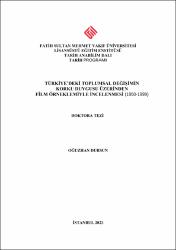| dc.contributor.advisor | Göleç, Mustafa | |
| dc.contributor.author | Dursun, Oğuzhan | |
| dc.date.accessioned | 2024-03-05T14:02:08Z | |
| dc.date.available | 2024-03-05T14:02:08Z | |
| dc.date.issued | 2023 | en_US |
| dc.identifier.citation | DURSUN, Oğuzhan, Türkiye’deki Toplumsal Değişimin Korku Duygusu Üzerinden Film Örneklemiyle İncelenmesi (1950-1999), Fatih Sultan Mehmet Vakıf Üniversitesi Lisansüstü Eğitim Enstitüsü Tarih Anabilim Dalı Tarih Programı, Yayımlanmamış Doktora Tezi, İstanbul 2023. | en_US |
| dc.identifier.uri | https://hdl.handle.net/11352/4736 | |
| dc.description.abstract | Bu çalışma, Türkiye Cumhuriyeti Tarihinin bir dönemine duygu tarihçiliği perspektifi ile yaklaşan ilk Türkçe tezdir. Çalışmanın amacı 20. yüzyılın ikinci yarısında Türkiye’de yaşanan siyasi, ekonomik, toplumsal ve kültürel/düşünsel değişimi bireylerin duygulanımları üzerinden incelemektir. Toplumsal tarih çalışmalarına bir katkı olan bu tez, korku duygusunun ve türevlerinin toplumsal değişimi nasıl açıklayacağını yanıtlayarak yeni bir yöntem önerir. Bu sayede, nörobiyolojik bir kavram olan korku, dönem bilgisine yönelik çarpanlarının tespit edilmesiyle pozitif bilimler parantezinden çıkarılıp tarihselleştirilir.
Korku hem her toplumda temel bir duygu olarak deneyimlendiği hem de bireysel ve kamusal yaşamı temelden etkilediği için bu çalışmada araştırma nesnesi olarak seçilmiştir. Bu çalışma boyunca, “Türkiye Cumhuriyetinde 20. yüzyılın ikinci yarısında korku duygusu nasıl değişti?” sorusunun yanıtı aranmıştır. Bu sorunun refakatıyla; korkulan unsurların niteliği, temsili, sebepleri ve biçimlerinin zaman içinde nasıl ve niçin değiştiği ele alınmış ve bu doğrultuda toplumsal değişimin anlamı sorgulanmıştır.
Bu tezde, korkunun zaman içindeki değişimini ölçebilmek için sinema filmlerinden oluşan bir örneklem ana veri seti olarak kullanılmıştır. 1950-1999 yılları arasında, her yıl için iki film olmak üzere, temsiliyet gücü yüksek filmler arasından 100 film seçilmiştir. Bu kümeden elde edilen veriler toplanmış, kodlanmış, kavramlar arasında ilişkiler kurularak tarihsel bağlama oturtulmuştur. İnceleme sonucunda ortaya çıkan ve zamanın ruhunu gösteren örüntüler, üç farklı dönem öne çıkarmıştır: 1950-1965, 1966-1979, 1980-1999.
vi
Bu çalışmada her dönemin temsilleri kendi içinde ele alınmıştır. Buna göre, 1950’lerde göç hareketleri ile zorunlu olarak yalnız kalmış kişilerin şehre dair endişelerine karşı sabır ve metanet duyguları yüceltilmiştir. 1960’ların ortalarından itibaren belirginleşen zengin-fakir gibi çatışma alanları ile bölünme korkusu, aile birlikteliği üzerinden değerlendirilmiş olup mücadele ve fedakarlık duyguları öne çıkmıştır. 1980-1999 arasındaki süreçte ise toplumsal yapıların çözülmesine dair üretilen korkular 80’lerde namus ve 90’larda ise özgürlük değerleri etrafında şekillenmiştir. Çalışmanın bulgularına göre, incelenen dönem boyunca, kaybetmekten korkulan unsurlar gittikçe bireysel nitelik kazanmıştır. Bu doğrultuda, Türkiye’deki toplumsal değişiminin yönü bireycilik lehine gelişmiş, değerler ve tutumlar da buna mukabil farklılaşmıştır. | en_US |
| dc.description.abstract | This dissertation is the first Turkish study to examine a historical period from the standpoint of historiography of emotions. The study's objective is to analyze how people's emotions reflect the political, economic, social, and cultural/intellectual development that occurred in Turkiye in the second half of the 20th century. In response to the question of how the emotion of fear and its derivatives may explain social development, this thesis, which is a contribution to social history studies, suggests a novel approach. By identifying its multipliers for historical knowledge, fear—a neurobiological concept—is therefore extricated from the category of positive sciences and historically contextualized.
Since fear is a basic feeling felt in every civilization and has a significant impact on both private and public life, it has been selected as the research topic for this study. “How did the perception of fear alter in the Republic of Turkiye in the second half of the 20th century?” is the central question of this study. Around this query, it was debated how and why the nature, representation, causes, and forms of the fear elements changed over time and the significance of this societal development was analyzed.
In order to track the evolution of fear over time, a sample of films was chosen as the primary data set for this study. Between the years 1950-1999, one hundred films were selected among the films with high representation power, two films per year. The information gathered from this cluster was gathered, coded, and given historical context by creating connections between concepts. The examination's patterns, which reflected the zeitgeist, highlighted three distinct historical periods: 1950–1965, 1966–1979, and 1980–1999.
viii
The depictions of each era are addressed separately in this study. As a result, the people who were left alone due to migration patterns in the 1950s felt more fortitude and patience in the face of their worries about the city. The 1970s saw the feelings of struggle and sacrifice come to the fore as conflicting issues like the rich and the poor and the fear of division were assessed through family togetherness. The anxieties of societal systems collapsing throughout the years 1980–1999 were formed by the values of honor in the 1980s and freedom in the 1990s. In Turkiye, the direction of social change developed in favor of individualism over the study period, and values and attitudes altered in line with this development, according to the study's findings. This means that the aspects that are feared to disappear over time gradually acquired an individual quality. | en_US |
| dc.language.iso | tur | en_US |
| dc.publisher | Fatih Sultan Mehmet Vakıf Üniversitesi | en_US |
| dc.rights | info:eu-repo/semantics/openAccess | en_US |
| dc.subject | Türkiye Cumhuriyeti Tarihi | en_US |
| dc.subject | Duygu Tarihi | en_US |
| dc.subject | Toplumsal Tarih | en_US |
| dc.subject | Korku | en_US |
| dc.subject | Toplumsal Değişim | en_US |
| dc.subject | Bireycilik | en_US |
| dc.subject | History of the Republic of Turkiye | en_US |
| dc.subject | History of Emotions | en_US |
| dc.subject | Social History | en_US |
| dc.subject | Fear | en_US |
| dc.subject | Social Change | en_US |
| dc.subject | Individualism | en_US |
| dc.title | Türkiye’deki Toplumsal Değişimin Korku Duygusu Üzerinden Film Örneklemiyle İncelenmesi (1950-1999) | en_US |
| dc.title.alternative | Studying Social Change In Turkey Through Fear Feeling With Film Sample (1950-1999) | en_US |
| dc.type | doctoralThesis | en_US |
| dc.contributor.department | FSM Vakıf Üniversitesi, Lisansüstü Eğitim Enstitüsü, Tarih Ana Bilim Dalı | en_US |
| dc.relation.publicationcategory | Tez | en_US |



















